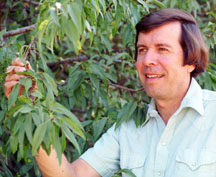|
|
Annual Reports
2001—Letter from the Director, Frank Zalom

Economics, Environment,
Efficacy, and UC IPM
Seldom, if ever, have California's farmers faced greater challenges in terms
of economics, environmental regulation, and pest control efficacy. Increased
production costs and flat to substantially reduced revenues have caused
intense scrutiny of every production input's value, including those related
to pest control. Growers are increasingly forced to weigh treatment costs
against anticipated returns, and this in turn alters "economic thresholds,"
one of the cornerstones of an IPM system. Environmental and worker safety
regulations are increasingly more complex, and pesticides are among the
most heavily regulated aspects of farming. The actual or potential loss
of many older pesticides has increased interest in the availability and
efficacy of alternative chemical and nonchemical options.
Objectivity rather than advocacy is essential when planning for the transition
from established pest control paradigms to new pest management systems.
Because of its emphasis on science and systems approach, IPM holds ever
more promise for assisting farmers and pest managers in solving pest management
problems. We at UC IPM remain dedicated to research and extension activities
that result in economical, environmentally benign, and effective pest
management – promoting facts, not fantasy.
What is UC IPM? It is
- an award-winning series of colorful and informative IPM
publications, used by tens of thousands of farmers and pest managers,
that present "how-to" information for pest identification,
monitoring, and management;
- a Web site with databases that are accessed over 1,300 times each
day by people seeking support for their agricultural and urban pest
management decisions;
- a modest but critical source of needed research
funds for scientists interested in studying pest control without
pesticides, understanding the ecology of pests in their environment,
and developing practical solutions to pest problems;
- a group of Cooperative Extension IPM advisors who adapt research
to local conditions and who work closely with county Cooperative Extension
farm advisors to present current pest management information to pest
control advisers and growers; and
- bilingual pesticide safety education workshops
and training materials for
pesticide applicators and handlers, farmworkers, and health care professionals
that will ultimately reach hundreds of thousands of Californians.
In fact, UC IPM is much more. It is the talented and dedicated people
who have labored long and hard since the beginning of the program to promote
and extend the exceptional pest management science base developed on the
University of California's campuses and in its Cooperative Extension offices.
As I step down as UC IPM's Director, I want to thank our staff and those
who have participated in the program over the years, both associated with
the University and not, for moving the promise of IPM closer to reality.
The best of times is still to come.
Top of page
|



